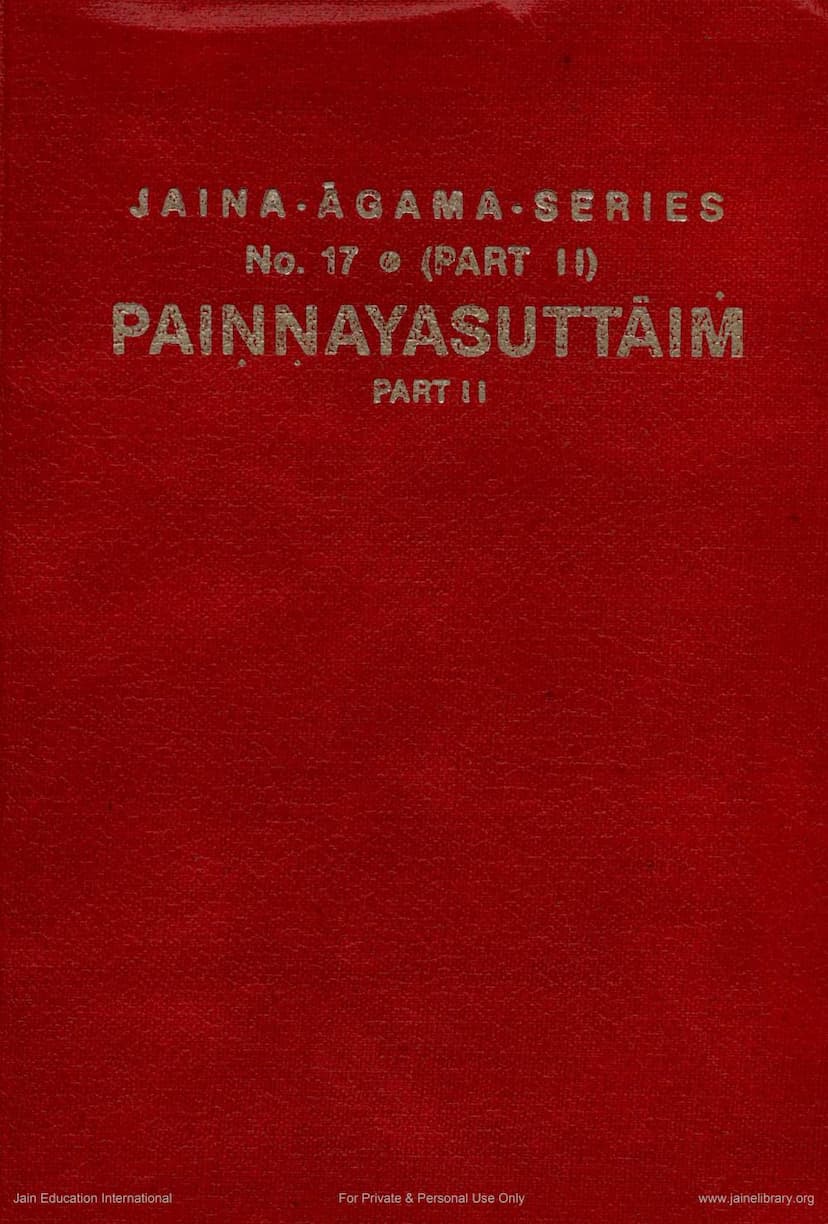Painnay Suttai Part 2
Added to library: September 2, 2025

Summary
Here's a comprehensive summary of "Painnay Suttai Part 2," based on the provided text:
Title: Painnay Suttai Part 2 (also referred to as Paiņṇayasuttam) Editors: Late Muni Shri Punyavijayaji and Pt. Amritlal Mohanlal Bhojak Publisher: Shri Mahavira Jaina Vidyalaya, Bombay Publication Year: 1987 (VS 2043 / Veer Samvat 2513)
Overall Purpose and Context: This volume, the second part of the Painnay Suttai series, is a critical edition and compilation of various Jain Agamic texts, primarily focusing on subjects related to monastic conduct, spiritual discipline, and the path to liberation. The series aims to preserve and present authentic Jain Agamas. This volume is noted to be significant as it contains works that are considered "Painnay" or "Prakirṇaka" sutras, which often supplement or elaborate on core Agamic principles.
Key Content and Themes:
The book contains twelve distinct tracts, each with its own introduction, critical analysis, and textual commentary. The overarching themes revolve around:
-
Spiritual Discipline (Ārādhanā): The central focus is on achieving liberation through rigorous spiritual practices. This includes detailed discussions on:
- Ārādhanāpatākā by Śrī Virabhadra: This tract, which gives its name to the second part of the series, delves deeply into the process of ārādhanā, particularly the practices and states of mind required for successful spiritual attainment. It covers topics like samlekhanā (disciplined self-purification and asceticism), parīkṣā (testing and self-examination), niryāmak (guidance), yogyatva (suitability for the path), agītārtha (dealing with those not learned in scriptures), asamvigna (dealing with the unmindMuni), nirjarana (shedding karma), sthāna (appropriate places), vasati (dwelling), saṁstāra (bedding), dravya-dāna (offering materials), samādhi-pāna (liquids for spiritual concentration), gaṇa-nisarga (passing on leadership), caityavandana (worship of sacred sites), ālocanā (confession of faults), vrata-uccāraṇa (taking vows), catuḥśaraṇa (taking refuge in the four jewels), duṣkṛta-grahā (condemnation of misdeeds), sukṛtānumodanā (rejoicing in good deeds), jīvakṣamaṇā (forgiveness of all beings), svajana-kṣamaṇā (forgiveness of relatives), saṅgha-kṣamaṇā (forgiveness of the monastic community), jinavara-kṣamaṇā (forgiveness of great souls like Jinas), and āśātanā-pratikramaṇa (atonement for disrespect).
- Paryantārādhanā (Ārādhanāsāra): This tract, also titled "Ārādhanāsāra," discusses various aspects of spiritual practice leading to the final stages of liberation.
- Ārādhanāpañcaka by various authors: This section includes five tracts related to ārādhanā, including those attributed to Abhayadeva Sūri.
- Other smaller tracts: The volume contains several other short treatises on spiritual practices, meditations, and ethical conduct.
-
Manifold Aspects of Monastic Life: The texts provide intricate details about the practical aspects of Jain monasticism, including:
- Conduct and Ethics: Emphasis is placed on living an ethical life, abstaining from harm, speaking truthfully, refraining from stealing, practicing celibacy, and limiting possessions.
- Asceticism and Austerities: The importance of various forms of penance (tapas) and self-discipline is highlighted as crucial for karma dissolution.
- Knowledge and Wisdom: The necessity of right faith (samyak darśana), right knowledge (samyak jñāna), and right conduct (samyak cāritra) is consistently stressed.
- Dealing with Obstacles: The texts address how to overcome internal obstacles like anger, pride, deceit, greed (kashāyas), passions, and external challenges like suffering, illness, and the influence of materialistic pursuits.
- Importance of the Guru: The role of the spiritual teacher (guru) is paramount in guiding the disciple through the complex path of liberation.
-
Textual Criticism and Scholarship:
- Editors' Contribution: The work is a result of meticulous scholarship by Muni Shri Punyavijayaji, who collected and organized the manuscripts, and Pt. Amritlal Mohanlal Bhojak, who prepared the critically edited text based on various ancient manuscripts. The introduction highlights the challenges of manuscript comparison and textual variations.
- Manuscript Sources: The editors utilized numerous manuscripts from various Jain libraries and collections, including those in Patan and Jesalmer, to ensure textual accuracy and authenticity. The introduction provides detailed descriptions of these manuscripts.
- Detailed Contents: The volume includes a very detailed table of contents, listing the verses and topics covered in each tract, which is invaluable for researchers.
Key Figures Mentioned:
- Śrī Virabhadra: Author of the Ārādhanāpatākā.
- Śrī Abhayadeva Sūri: Associated with one of the Ārādhana tracts.
- Śrī Uddyotanasūri: Author of Kuvalayamālā, from which one tract is extracted.
- Śrī Hemacandrācārya: Mentioned in relation to manuscripts preserved in the Jain Jñānamandira in Patan.
- Muni Shri Punyavijayaji: The senior editor, instrumental in the research and compilation of the Agamas.
- Pt. Amritlal Mohanlal Bhojak: The junior editor, responsible for the critical editing and textual work.
- Muni Shri Jambūvijayji: Mentioned for his continuous support and guidance after Muni Punyavijayaji's passing.
Significance:
This volume is a crucial resource for scholars and practitioners of Jainism interested in the practical aspects of monastic life and the path to spiritual liberation. The detailed textual work and the inclusion of various related tracts make it a comprehensive study of ārādhanā within the Jain tradition. The emphasis on confession, penance, self-control, and devotion to the Jinas and the Agamas underscores the core values of Jain spiritualism.